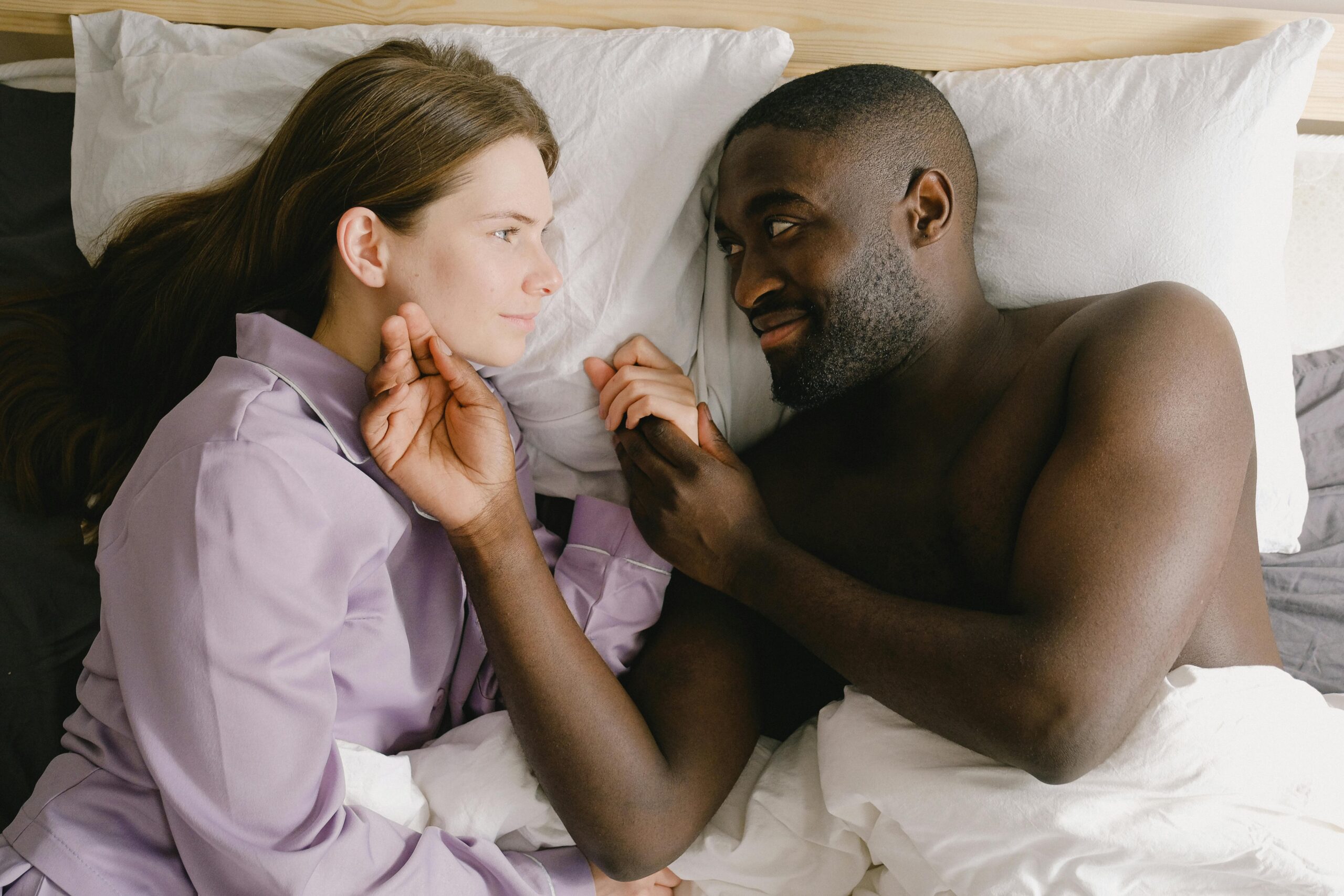
Why do I bleed after sex? Causes, treatment and when to call your GP
In this article
What's the lowdown?
Bleeding after sex is usually nothing to worry about – if it’s minor or goes away quickly, you don’t need to see your GP
However, if the bleeding persists, or it happens every time after sex, you should get it checked out by a healthcare professional who will examine your cervix
There are various causes for post-coital bleeding, but you may want to consider taking a pregnancy test or STI test to rule out these out (Get a Clearblue pregnancy test from Amazon)
Bleeding after sex, also known as post-coital bleeding, is in most cases nothing to worry about. 9% of women with periods experience bleeding after sex. But in some rare cases, it may be a sign of something more serious and should be explored further by a health professional like your GP. There are quite a few reasons why you may bleed after (or during) intercourse; from lack of lubrication to having an STI. Vaginal bleeding can present as a brown or pink discharge, or light ‘spotting’ of blood – which as the name suggests, is when small spots of blood are found in your underwear or on your toilet paper. Navigating bleeding and contraception can be confusing, but it doesn’t have to be! If you‘d like to chat to one of The Lowdown’s doctors about your experience with bleeding after sex on the pill or coil, you can make an appointment here.
Read on to discover the possible reasons for blood after sex and when you should seek medical advice.
What are the causes of bleeding after sex and is it normal?
So what are the most common reasons for bleeding after or during sex? Well, there’s a few. Some are common and can be treated at home, while some may require you to visit a doctor for an examination. If you have other symptoms as well as vaginal bleeding after sex (such as pain during intercourse or in your pelvis), it’s best to get it checked out by a medical professional.
- Having sex for the first time – resulting in the hymen breaking (see more below).
- Childbirth – following childbirth the vaginal tissues may be more vulnerable to injury.
- Menopause – after the menopause, lower levels of oestrogen can make the vaginal walls thin, dry or inflamed.
- Medications – some medications can cause vaginal dryness, including some antidepressants, allergy pills and cold/flu remedies.
- Chemicals – some chemicals cause vaginal dryness or irritation including laundry detergents, feminine hygiene products and swimming pool chemicals.
- Douching – having sex after douching or sometimes immediately after bathing or showering can result in friction that causes the vaginal tissues to tear.
- Engaging in sex before arousal – not giving your body time to naturally lubricate.
- Friction during sex – increased friction and lack of lubrication may cause the vaginal tissues to tear
- Sexually transmitted infections – STIs, such as chlamydia and gonorrhoea, can cause vaginal bleeding and need to be treated as soon as possible (check out our guide to STIs).
- Cervical ectropion – a common cause of bleeding which can be caused by hormonal changes, pregnancy and contraception – especially the combined oral contraceptive pill. It’s caused when the cells from inside the cervix (the neck of the womb) grow on the outside surface of the cervix (the cervix sits inside at the top of the vagina). These cells bleed more easily and can cause bleeding after contact during sex. It is benign and NOT linked to cervical cancer.
- Polyps – Some women may find they develop small, benign growths on their cervix called polyps, which are full of blood vessels, meaning they can bleed a lot. In some cases, your GP may send you to a specialist to assess whether they are definitely benign or need removing.
- Pelvic inflammatory disease (PID) – this can cause pain in the lower abdomen, vaginal discharge and irregular vaginal bleeding, alongside other symptoms. Most cases of PID are caused by an STI or bacterial infection, that has spread from the vagina or cervix to the higher reproductive organs. If you think you may have PID, you should seek urgent medical advice.
- Fibroids – Fibroids are non-cancerous growths that can grow on the inside of or around the womb and cause abnormal vaginal bleeding.
- Cervical cancer – In rare cases, bleeding after sex can be a sign of cervical cancer. Other symptoms can include pain during or after sex, vaginal discharge and pain in the pelvis or lower back. It is important to keep up to date with cervical screening tests which are offered from the age of 25 in the UK.

Is it normal to bleed after having sex for the first time?
It is perfectly normal to experience some light vaginal bleeding that looks like bright red blood after sex especially the first time you have sex, although not everyone will. Bleeding after losing your virginity could relate to a few different things, including vaginal dryness, low arousal, or the hymen breaking. The hymen is a small piece of skin that covers the entrance of the vagina. The hymen can actually break prior to losing your virginity through some overly active sports, so there may be no bleeding after sex in this case either. If you’re concerned about bleeding after the first time you have sex, speak to your GP, or make an appointment at a sexual health clinic.
Why you might be bleeding after sex on the pill
Certain types of contraception or birth control may cause bleeding, or brown/pink discharge at irregular times of the month, which may coincide with sexual intercourse. Many Lowdown users have reported spotting or bleeding on the pill. In particular, those who use the progestogen-only pills (mini pills) like Cerazette or Noriday. As of September 2024, 9% of combined pill reviewers and 14% of mini-pill reviewers on The Lowdown reported spotting. Often bleeding will settle after the first 3 months of use. If you experience persistent irregular bleeding beyond this time, a change in the pattern of bleeding, or persistent post-coital (after sex) bleeding, then speak to your doctor or healthcare professional. Some Lowdown users also report vaginal dryness as a side effect of the combined and progestogen-only pills, which can in turn cause bleeding after sex due to lack of natural lubrication inside the vagina. Lube up, people!
Bleeding after sex with a coil
Erratic bleeding or spotting after having an IUD or IUS fitted can be an initial side effect – whether immediately or the morning after. Sex should be avoided for 24 hours after coil insertion (sorry, we don’t make the rules) to help it settle in and prevent it from moving, being dislodged or bleeding. Be vigilant about any unexpected, prolonged changes to your bleeding pattern. Consider taking STI and pregnancy tests, make sure you’re up to date with your latest cervical smear, or book to see your GP or sexual health clinic for an internal examination if you’re unable to link the cause of bleeding to your IUD.
Can I bleed because of a dislodged coil?
When your coil becomes dislodged, it moves out of place, partially out of the cervix or into the vagina. You will normally feel cramping or discomfort and sometimes post-coital bleeding. If you experience bleeding during or after sex with the IUS, like the Mirena coil, or IUD for more than three months after having it fitted, or notice a change to your bleeding pattern, speak to your GP or visit your nearest sexual health clinic to rule out a displacement.
Cervical ectropion
Another potential cause of bleeding during sex is cervical ectropion. In short, this is when the soft cells on the inside of your cervix (neck of the womb) begin to grow on the outside of the cervix. The soft cells produce more mucus and bleed easily on contact or if hit by something (yep, that includes a penis), whereas the normal outside cells offer more protection, and are less likely to bleed if knocked. The chances of developing cervical ectropion is increased for those using combined hormonal contraception, like the combined pill, as the changes in these cells are driven by oestrogen.
Is bleeding after sex a sign of pregnancy?
During pregnancy, your body goes through a variety of changes, particularly your cervix. You may experience a pinkish or brown discharge or some blood spotting after sex during the first few months of your pregnancy. This may happen due to the developing embryo implanting itself in the wall of your womb and bleeding may occur when your period would have been due. If you are concerned about unexpected bleeding and there’s a chance you could be pregnant, take a pregnancy test (buy here) and contact your GP. If bleeding after sex becomes more than just spotting or brown/pink discharge, or starts to become heavy with clots, or you have any additional symptoms such as tummy, pelvic, chest or shoulder pain, lightheadedness or breathlessness, you should seek urgent medical care.
Postmenopausal and bleeding after sex: should I call a doctor?
Oestrogen is what keeps your vaginal tissues healthy, so when a woman’s oestrogen levels drop during the menopause it can cause the vaginal walls to become thin, dry and inflamed. This is known as genitourinary syndrome of the menopause (GSM) or vaginal atrophy. Therefore when a woman has sex it can often lead to bleeding. Using a lubricant will help (get water-based Yes lube from Amazon), but if the problem persists, or occurs at other times not in relation to sex, then make an appointment with your doctor.
When to see a doctor for spotting or bleeding after sex?
Ultimately, the cause of post-sex bleeding can vary. Minor spotting or bleeding that goes away quickly is very common, and you may not need to see a doctor. However you should consider the need for pregnancy and STI tests to rule these out as the cause of bleeding. If you have prolonged and persistent bleeding, or bleed every time after sex, then you should contact your GP, who will examine your cervix and investigate for more serious causes.If you have a normal cervix on examination but continue to bleed after sex, or your cervix looks abnormal, then your GP may refer you to a colposcopy clinic, where you will have a more detailed examination of the cervix. It’s important to remember that if you have noticed delayed bleeding after sex, such as the day after or in the days following, this may not be related. You could be experiencing ovulation bleeding, or an irregular menstrual cycle, but it’s important to follow the guidance above, to rule out other more serious causes of bleeding. You can also book an appointment with our friendly doctors if you need advice.
Our medical review process
This article has been medically reviewed for factual and up to date information by a Lowdown doctor.




